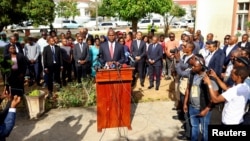Daniel Chapo, the presidential candidate of Mozambique’s ruling party, is comfortably leading the vote count in nine of the country's provinces and appears set to become the country’s next president. His closest challenger was running a distant second Wednesday as vote counting from last week’s election continued.
Preliminary results from Wednesday’s election announced so far show Chapo leading with over 50% of the vote in nine of Mozambique’s 11 provinces.
In the capital, Maputo, Chapo is ahead with over 53 percent, followed by independent candidate Venancio Mondlane at just under 34 percent.
Chapo has led at every polling station counted, according to the chairperson of the Maputo Provincial Election Commission, Lucilia Sitoe.
She said, “Daniel Franscisco Chapo, 656,056, which corresponds to 68.02. Venancio Antion Bila Mondlane, 260,792, which corresponds to 27.04%.”
The two other presidential candidates, Ossufo Momade of the opposition Renamo party, polled 9.6% of the vote in Maputo, followed by Lutero Simango of Mozambique Democratic Movement, MDM with 2.86%.
A similar scenario is also occurring in the central province of Zambezia, traditionally an opposition stronghold. There, Chapo is leading with 73%, with Mondlane a distant second with 14.7%.
In Sofala province, another longtime opposition stronghold, Chapo held 65% of the vote.
Turnout in Wednesday’s election was relatively low, less than 50%. According to data shared by electoral bodies, close to 9 million of Mozambique’s 17 million registered voters did not vote.
In the northern province of Nampula, the largest constituency in the country, more than 2 million voters stayed home and tens of thousands cast blank ballots – a common form of protest in Mozambique, showing dissatisfaction with all the candidates.
The numbers were similar in Zambezia, the country’s second-largest constituency.
In Cabo Delgado province, plagued by an insurgency by Islamist militants for several years, 925,000 people did not vote, 35,000 cast blank ballots and another 18,000 votes were spoiled.
The chairman of Mozambique’s national elections commission vowed that every ballot cast will be counted.
He said, “Every vote will be counted definitely, we are ready for that. The counting system is participatory because all the political parties are represented at polling stations so every vote will count and we just hope for the best.”
Final results are expected in about two weeks. Independent political analyst Dercio Alfazema said the next president faces high expectations from the public.
“Our expectations are number one, is to be well governed, so we have a challenge to obtain a better result, the people want the end of corruption, we are looking for more security, we are looking for more health service and the quality of education, the extension of the services such as infrastructure. We also have the problem of terrorism in the north, the kidnappings; the young people are looking for jobs and some opportunities,” said Alfazema.
The president-elect will be sworn into office in January, when current President Filipe Nyusi, who is barred by the constitution from running again, steps down at the end of his second five-year term.
Mariama Diallo, VOA's Nairobi bureau chief, contributed to this story.





